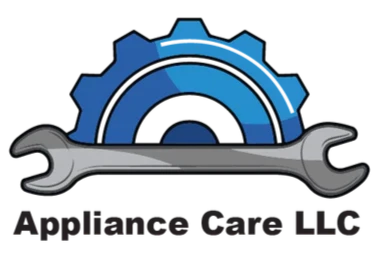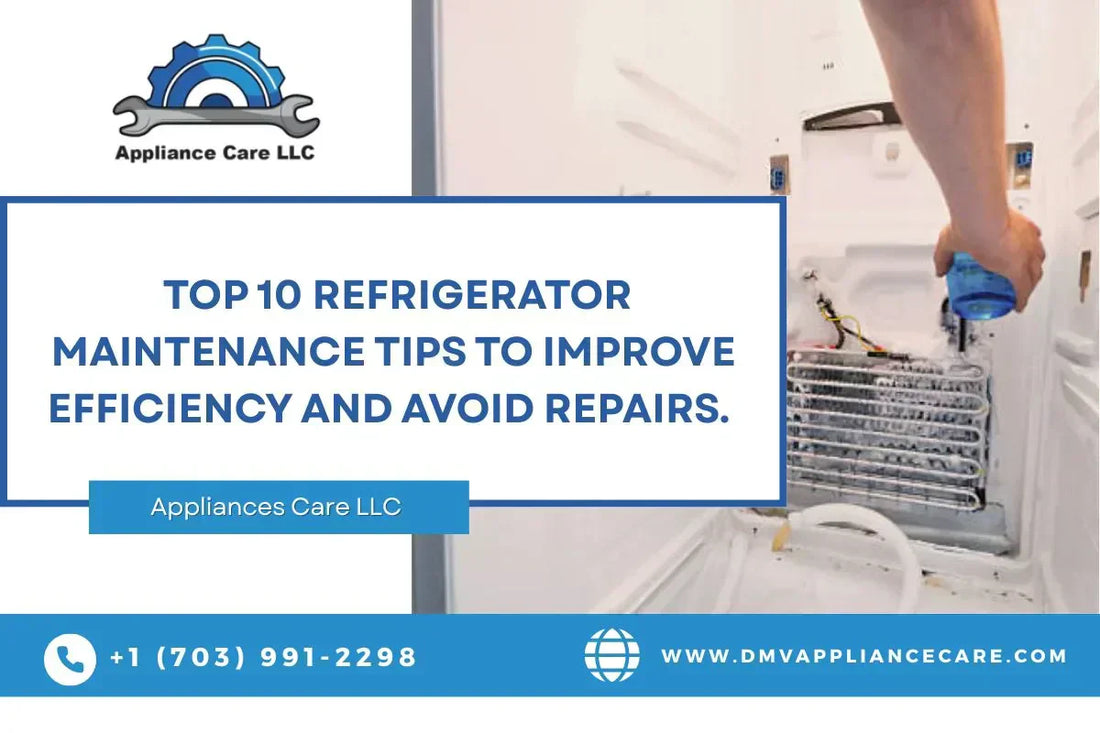Introduction:
Food safety, avoiding expensive repairs, and energy cost savings all depend on your refrigerator being kept in top shape. Following these refrigerator maintenance tips will help to keep your refrigerator and improve its life. In this post, you will also get some helpful fridge care tips and learn how to maintain a refrigerator in good condition just by following simple steps. These are some of the best strategies in a smart appliance maintenance plan that every homeowner should use.
 Tip 1: Inspect and Replace Appliance Seals to Avoid Energy Loss
Tip 1: Inspect and Replace Appliance Seals to Avoid Energy Loss
Worn-out or damaged door seals (gaskets for sealing) let cool air escape, which makes the fridge run more and use more electricity. Regularly check the rubber seals for wear, cracks, or gaps.
Fridge cleaning tips: Clean the seals with a wet cloth or towel to make sure they are clear of food particles or mold.
Replace them right away if they are worn to avoid needless refrigerator energy loss and ensure efficiency.
Tip 2: Clean Condenser Coils Every 6 Months
Dusty or unclean condenser coils harm your refrigerator's efficiency, which increases the more use of electricity. Remove dust from the coils, whether in the back or under the refrigerator, by using a coil cleaning brush after turning off the appliance. If you include coil cleaning in your appliance maintenance schedule, it can help to reduce electricity bills and increase the life of your refrigerator.
Tip 3: Set Proper Temperature (37-40°F)
Setting your refrigerator temperature between 37 and 40 degrees Fahrenheit guarantees food safety and lessens energy waste. Too low a temperature might cause the refrigerator to overwork; too high may destroy food.
Tip 4: To ensure proper airflow, keep vents open.
Even cooling is ensured by sufficient airflow within your refrigerator. Food items should be kept away from vents and should not be blocked. This straightforward but frequently ignored refrigerator maintenance tip is essential to keeping a refrigerator in good working order and can have an influential impact on performance.
Tip 5: If Ice Forms, Defrost the Freezer
When the ice accumulation reaches 1/4 inch, manually defrost your freezer if it doesn't have an auto-defrost feature. Excessive ice affects performance and energy efficiency by taking up storage space and making the appliance work harder.
This is an essential step in keeping a refrigerator in good working order.
Tip 6: Regularly Clean and Deodorize the Interior
Stains, odors, and spilled food can accumulate inside the refrigerator. At least once a month, use water and a simple detergent to clean surfaces, drawers, and shelves.
Cleaning advice for refrigerators: To keep the refrigerator smelling fresh and to neutralize odors, put baking soda inside.
Tip 7: Avoid Filling the Refrigerator to Overflow
Your appliance will have to work harder to keep things cool when it is overloaded because airflow is limited. For the best results and energy savings, keep the refrigerator between 70 and 80% full.
You shouldn't ignore this excellent refrigerator energy-saving tip.
Tip 8: Check and Clean the Drip Pan
Many fridges have a drip pan underneath to collect condensation. Over time, this can become dirty or moldy. Check and clean it periodically as part of your appliance maintenance plan to prevent odors and pests.
Tip 9: Replace Water Filter (if applicable) Every 6 Months
If your refrigerator has a water dispenser or ice maker, replace the water filter every 6 months to ensure clean, fresh-tasting water.
Neglecting this can cause clogs and bacterial buildup, which is why it's an important part of how to maintain a refrigerator in good condition.
Tip 10: Keep the Fridge Level to Avoid Door Alignment Issues
An uneven fridge can cause the door to misalign, leading to energy loss and uneven cooling. Check if the fridge is level and adjust the legs if needed. Such fridge care tips play a big role in refrigerator maintenance tips that every homeowner should follow.

Bonus Tips: Seasonal Maintenance Checklist
Spring: Deep clean the interior and exterior as part of your appliance maintenance plan and routine fridge cleaning tips.
Summer: Inspect seals and adjust temperature settings following important refrigerator maintenance tips.
Autumn: Clean condenser coils to maintain efficiency with smart refrigerator energy-saving tips.
Winter: Check the water filter and defrost the freezer if needed, ensuring you know how to maintain a refrigerator in good condition.
DIY or Professional Help: When to Call a Certified Appliance Repair Technician
Although some difficult problems like compressor failure, refrigerant leaks, or electrical issues should be handled by a qualified appliance repair professional, these refrigerator maintenance tips are simple do-it-yourself projects.
When required, get professional assistance; don't endanger more damage. Always consult a technician if you are not sure whether a repair should be DIY or professional.
From refrigerators to freezers to ovens to washers and more, the Home Appliance Care team provides trustworthy and reasonably priced appliance repair services. Our team of quick, professional diagnoses and repairs helps homeowners to avoid costly replacements.
Home Appliance Care is your reliable partner for all appliance maintenance and repair requirements, whether you require emergency service or a fast checkup. Maintaining your appliances with the right appliance maintenance plan ensures long-term reliability.
Conclusion: Save Money and Extend Appliance Life with Regular DIY Care
Following these refrigerator maintenance tips will help you save money on energy bills, avoid unexpected repairs, and ensure your fridge stays in top shape.
Including these in your appliance maintenance plan is a smart move for every homeowner looking to maximize appliance lifespan with regular fridge care tips and refrigerator energy-saving tips.
FAQs: Common FAQs About Appliance Maintenance
Q: How to maintain the refrigerator in good condition?
A: For best operation, clean the condenser coils twice a year and the interior once a month. Regular fridge cleaning tips and basic checks should be part of your appliance maintenance plan.
Q: What are the key signs my fridge needs maintenance?
A: Water leaks, strange noises, insufficient cooling, and running up your energy bill are signs you should follow refrigerator maintenance tips.
Q: Can I do all the maintenance tasks myself?
A: A certified appliance repair technician should be contacted for technical issues, but the majority of fridge care tips can be done on your own by yourself.
Q: How can I cut down on my refrigerator’s energy use?
A: A freezer or fridge can minimize electricity consumption by washing coils, evaluating seals, setting the correct temperature, and not overloading. These are essential refrigerator energy-saving tips for efficient performance.

